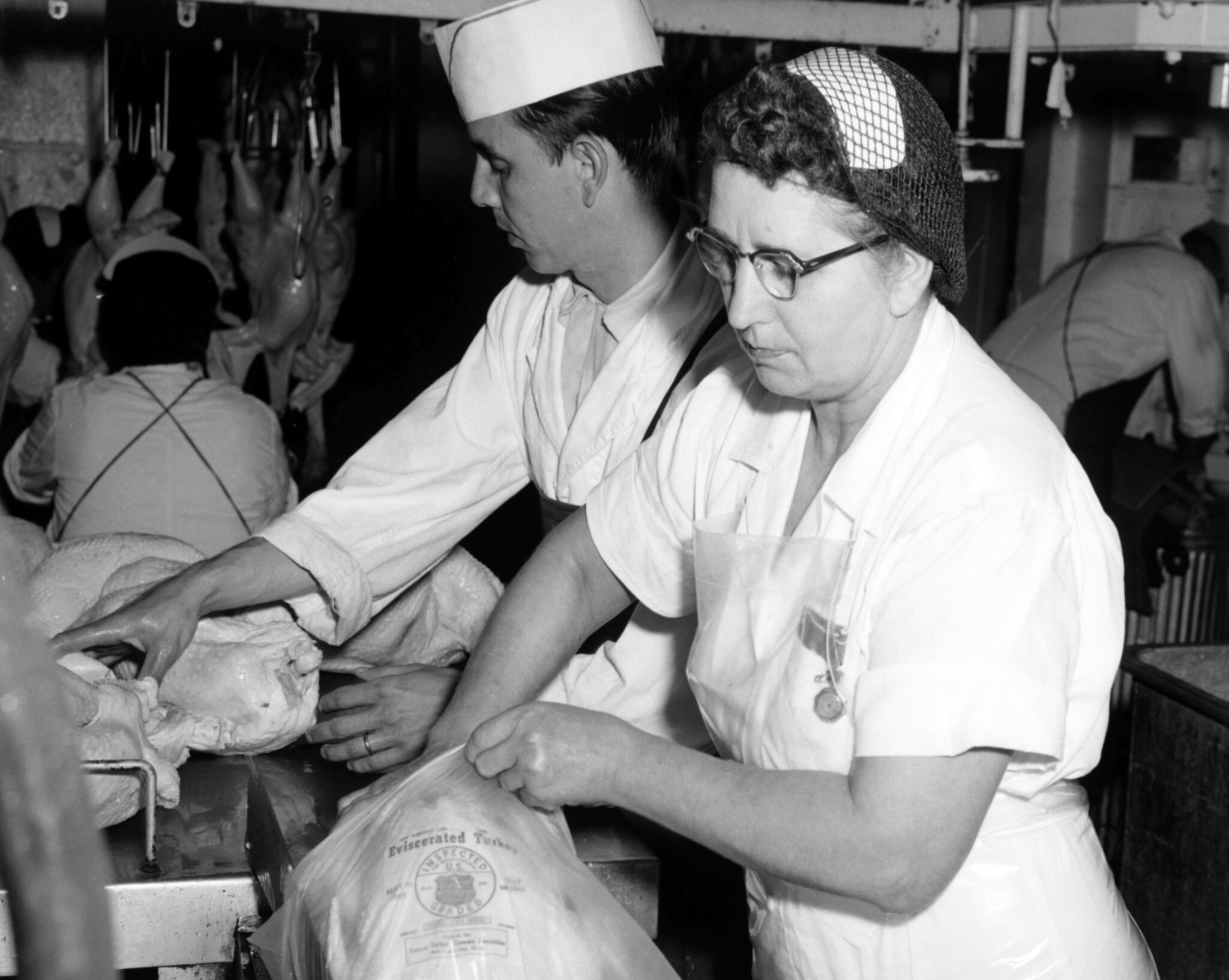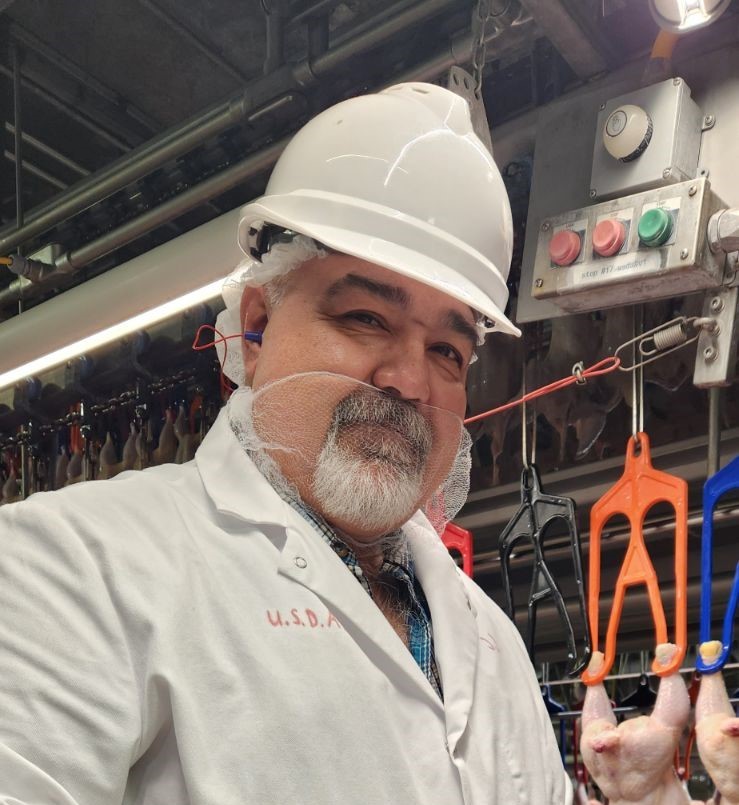
Dr. Michael Dendinger Applies Field Experience to OEED
By Suzanne Hensell, OPACE

Six-year FSIS employee Dr. Michael Dendinger is currently a program analyst with the agency’s Office of Employee Experience and Development (OEED). He began his FSIS career as a supervisory public health veterinarian (SPHV) in the Office of Field Operations (OFO). His OFO experience provides him with a unique perspective that he applies to his role in employee engagement and recognition.
Education and Career Path
From an early age, Dendinger was interested in science and animals and wanted to be a veterinarian. Virginia Polytechnic Institute and State University (Virginia Tech) is where Dendinger completed his Bachelor of Science degree in biological sciences in 2013. He earned his Doctor of Veterinary Medicine degree in 2017 at Virginia-Maryland College of Veterinary Medicine, a leading biomedical teaching and research center operated by two land-grant universities, Virginia Tech and the University of Maryland.
During his fourth year of veterinary school, Dendinger worked in various private practices under the supervision of a veterinarian. While he enjoyed working with animals, he didn’t want a career in private practice. After graduating, Dendinger was looking for a big change, so he sought the stability of a government job and the work-life balance it offered. He began learning about different public sector jobs and decided FSIS was the best path for him because a career in public health satisfied his desire to help people.
He found FSIS opportunities on USAJobs.gov and applied for the SPHV position in the Des Moines district. For two years, he supervised food inspectors and consumer safety inspectors in slaughter and processing establishments, performing ante- and post-mortem inspection and preparing dispositions, export certificates and pathology samples, among other tasks. He worked in North Dakota, South Dakota and Minnesota with multiple species of animals, including beef, swine, goat, sheep, bison and elk, as well as with processed meats, including sausage, ham and bacon. Seeking to return to his Virginia roots, he applied for a lateral position in his hometown of Harrisonburg, where he became a relief SPHV in poultry establishments, covering five different establishments and filling vacancies.
In early 2020, Dendinger learned of the opportunity in OEED. He has always liked writing and analyzing data, and the OEED program analyst position would present new and interesting challenges. During his time in OFO, he sometimes heard complaints about things he would consider “engagement,” and he thought he could use that information to help people in the field. He transitioned from Harrisonburg to Washington, D.C. and was determined to use his field experience and his understanding of some of its challenges to help FSIS employees working to keep our food safe. Dendinger advises, “Be flexible in your career path, and you will be successful. Keep your mind on the mission and embrace the experience.”
Improving Employees’ Work Experience Through OEED
Dendinger enjoys his work in OEED. “An engaged workforce is key to keeping employees happy and striving to do their best for the agency. Strong morale is also important for improved retention,” said Dendinger. His employee engagement activities include contributing to the New Employee Onboarding program to make it uniform agency-wide. This ongoing project, expected to be completed by the end of Fiscal Year 2024, is the result of employee feedback that indicated people were receiving a vastly different orientation experience. OEED learned that employees would talk to one another and realize they didn’t receive the same information as another employee. Dendinger believes standardizing orientation is important because it is the first impression an employee receives of the agency.
Employee recognition programs are also important to Dendinger. He serves as the project manager for the Administrator's Awards for Excellence (AAFE) program, which is the most prestigious agency recognition program for innovative efforts to prevent foodborne illness and protect public health. Employees and supervisors may submit AAFE nominations. Dendinger oversees the nomination review board, which provides recommendations to the Office of the Administrator, who ultimately selects the award recipients.
Another large OEED program in which Dendinger has been involved is assisting with the re-establishment of the Non-Monetary Awards Program, which was retired several years ago but is being brought back based on employee feedback. In coordination with OPACE, Dendinger and his OEED colleague, Program Specialist Erin Kersse, have refreshed the program. The program allows supervisors to provide frequent and timely recognition of individual and group contributions with agency-branded items such as hats, water bottles, shirts and other apparel. These non-monetary awards are are presented shortly after the employee's effort that prompted the desire to recognize them.
OEED Director Val Green values Dendinger’s contributions. “Dr. Dendinger has been an invaluable asset to the Employee Engagement and Recognition Staff's successful programs, thanks to his extensive experience in the field. His commitment to the AAFE is commendable. Despite being on detail to another department during the annual ceremony, his leadership was still felt, and the ceremony would not have been a success without his groundwork,” she said.
FSIS Core Value Empowered
Dendinger challenges himself and his team to do the best work they can. He feels FSIS empowers him to be successful through training and resources to help him stay up-to-date with policy and scientific methods that assist in protecting public health. He recently began a course offered by the agency called Data Camp, where he is learning how to code using a program called Python. His goal is to be able to write a program that will allow him to create lists of items and sort, group and find the information he needs to make the most of the data. In his program analyst role with OEED, he works with a lot of data, ratings and surveys. For example, the AAFE program typically involves over 150 participants and requires tracking all of their information, including name, position, contact information and what award they won. Dendinger looks forward to being able to use Python to sort, analyze and manage all that data.
“Working with my team to complete projects and meet deadlines is very fulfilling. I also enjoy collaborating with other teams in and out of my program area, and by doing so, I contribute to our mission and strategic goals,” said Dendinger.
Down Time
When he is with friends, Dendinger sometimes speaks with them about food safety. “They respect my opinion and take me seriously because they know my background and occupation and trust my judgment,” he said.
When he’s not performing tasks for OEED, he loves to cheer on the Washington Capitals and stay active traveling, hiking, rock climbing, geocaching and playing disc golf, video games, board games and the ukulele. He also has an artistic side and enjoys coloring using crayons, colored pencils and markers. In addition, he loves punk rock and ska music, a fusion of Caribbean and African music.
He lives by his motto: “Be flexible and try new things! It’s an important way to live life and important in your career.”
Pictured above: Dendinger standing in one of the many watch towers of Castillo San Felipe del Morro in San Juan, P.R.
Pictured above: Dendinger hiking in Painted Canyon in Theodore Roosevelt National Park, N.D.

Pictured above: Dendinger taking a break from hiking in Great Falls National Park, overlooking Mather’s Gorge, Great Falls, Va.
Photos by Heidy Mercado.


